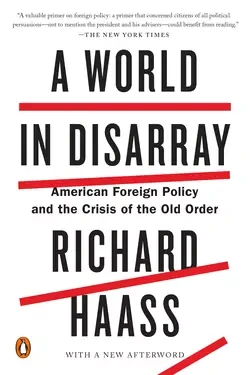
A World in Disarray
American Foreign Policy and the Crisis of the Old Order

CFR President Richard N. Haass argues for an updated global operating system to address challenges from terrorism and the spread of nuclear weapons to climate change and cyberspace.
- Book
- Foreign policy analyses written by CFR fellows and published by the trade presses, academic presses, or the Council on Foreign Relations Press.
Read an excerpt of A World in Disarray.
In a new afterword to the paperback edition, Richard Haass looks at developments over the past year (2017) and argues the world is in greater disarray than it was a year ago, in no small part because of the foreign policy of the Trump administration.
More on:
"These are no ordinary times. It will not be business as usual in a world of disarray; as a result, it cannot be foreign policy as usual," writes Richard Haass, president of the Council on Foreign Relations, in his latest book, A World in Disarray: American Foreign Policy and the Crisis of the Old Order—a timely examination of a world increasingly defined by disorder. In three parts, the book contemplates the history of world order from the rise of the modern state system to the end of the Cold War; accounts for the momentous shifts in the last quarter century to shed light on the current state of affairs, and outlines specific steps to tackle the many challenges ahead.
Haass argues that the fundamental elements of world order that have served the world well since World War II have largely run their course. The Middle East is unraveling. Asia is threatened by China's rise and a reckless North Korea. Europe, for decades the world's most stable region, is staggering under the weight of prolonged low economic growth, anger over immigration, and a rise in populism and nationalism. He writes that the election of Donald J. Trump and the unexpected vote for "Brexit" signal that many in modern democracies reject globalization and international involvement, including borders open to trade and immigrants as well as a willingness to maintain alliances and overseas commitments. Add to these concerns the threats of terrorism, the spread of nuclear weapons, climate change, and cybersecurity, and "it is painfully evident that the twenty-first century will prove extremely difficult to manage," says Haass.
He makes the case that the world needs a new operating system—which he calls World Order 2.0—that reflects the reality that power is widely distributed and that borders count for less. One critical element of this adjustment will be adopting a new approach to sovereignty, one that embraces its obligations and responsibilities, as well as its rights and protections. Haass also details how the United States should act toward China and Russia, as well as in Asia, Europe, and the Middle East. Finally, he asserts that the United States needs to define national security more broadly, addressing what are normally thought of as domestic issues—from dysfunctional politics to mounting debt—as well as coming to an agreement on the nature of the United States' relationship with the rest of the world.
Educators: Access Teaching Notes for A World in Disarray.
More on:
In the News
Richard Haass on KERA ThinkKERA
Richard Haass on Slate's The GistSlate
Richard Haass on Hugh HewittHugh Hewitt
Richard Haass on CBC The CurrentCBC
Richard Haass on Squawk BoxSquawk Box
Richard Haass on Imus in the MorningImus in the Morning
Richard Haass on Business InsiderBusiness Insider Live
Richard Haass on Yahoo NewsYahoo News
Richard Haass on VoxVox
The International Implications of Trump's Refugee BanNPR
Maintaining Stability in a Fragile WorldKQED
You Can't Always Get the World Order that You WantWar on the Rocks
Richard Haass on WNYCWNYC
Richard Haass on Hugh HewittHugh Hewitt
Richard Haass on Real Time with Bill MaherReal Time with Bill Maher
Richard Haass on Charlie RoseCharlie Rose
Richard Haass on WTTW ChicagoWTTW Chicago
Richard Haass on WBEZ ChicagoWBEZ Chicago
Trump Foreign Policy: Do No HarmWSJ Opinion Journal
Richard Haass on Bloomberg DaybreakBloomberg Daybreak
Richard Haass on Tavis SmileyTavis Smiley
Richard Haass on Bloomberg Surveillance: World Relies on 'Steady, Predictable' U.S.Bloomberg Surveillance
Richard Haass on BBC HardtalkBBC Hardtalk
Richard Haass on Foreign Policy's 'The Editor's Roundtable' PodcastForeign Policy 'The Editor's Roundtable'
Richard Haass Sees A 'World In Disarray' As Trump Prepares To Take OfficeNPR's Weekend Edition
 Online Store
Online Store